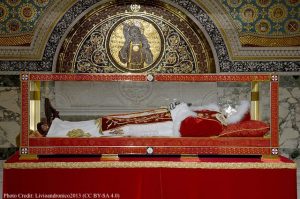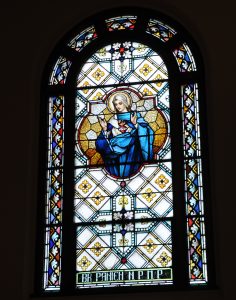
Today’s problems often seem to be the worst ever faced by the human race. Thus, It is easy to be overwhelmed by focusing on the division, apostasy, scandal, and confusion of the current age.
One antidote to this sensation is history. The study of the past provides a perspective that cannot be gained by looking exclusively at the current situation. The ancient Roman philosopher, Cicero, said it well: “Not to know what happened before one was born is always to be a child.”
The Church that Pius Inherited
Imagine a Church beset by powerful enemies who make no secret of their desire to destroy Holy Mother Church. Imagine Church leaders who did not accept basic Church teachings. Imagine a widespread public attitude in which it was considered popular to laugh at the Church rather than to follow Her.
No, this is not a description of the twenty-first century Catholic Church. This situation existed a century-and-a-half ago. The governments of England, Germany, and Italy were openly anti-clerical. France had a veneer of Catholicity, but many enemies of the Church lurked within its bureaucracy. Governments were taking over Catholic schools in the name of “liberty.” The followers of Freemasonry filled governments positions across Europe, advocating a secular doctrine that defined religion in purely human terms and asserted that no religion was preferable to any other.
In the midst of this headlong rush to slough off religion stood a great man of God, a true son of Our Lady, and a divinely inspired leader of the Holy Roman Catholic Church, Blessed Pius IX.
An excellent place to begin a study of that tumultuous era is Blessed Pius IX by Roberto de Mattei. Professor de Mattei is familiar with both the times of Pius IX and surrounding political atmosphere. The professor teaches modern history at the University of Cassino in Rome. He is an author of many books and articles about the Church and history. He also oversees the Lepanto Foundation in Rome and is editor-in-chief of the monthly review Radici Cristiane.
What Does Saint Thomas Say About Immigration?
The Challenge of the Revolutionaries
This book is not a complete biography, since it focuses exclusively on Blessed Pius IX’s papacy (1846-1878). These were times of massive peril for the Church. In 1848, humanist revolutionaries rocked Europe. “Today is the last day of the priests,” was a common cry. The end of Church authority appeared imminent, and politicians competed to be the most profane.
Nowhere was the revolutionary spirit stronger than in Italy. At this point, the peninsula was still divided into several kingdoms, of which the Papal States was the most important. The revolutionaries saw the death of Pope Gregory XVI and his replacement by Blessed Pius IX as fortunate. Italian philosopher and politician Vincenzo Gioberti cried out, “I would respect a reformist devil more than a retrograde angel.” Gioberti’s associate Giuseppe Montanelli argues that, “There were two Italys,” one consisting of all the intellectuals and another of peasants, workers, and priests.
At first the new pope was thought to be sympathetic to the revolutionaries. The insurrectionist Giuseppe Mazzini wrote to Blessed Pius, advocating that the pope, “Announce a new Era: say that humanity is the sacred daughter of God, and that those who violate its rights to progress and free association are on the road of error…Unite Italy, your country.”
This time of revolutionary ferment was a defining moment for Blessed Pius, one with consequences that still reverberate. Faced with the necessity to decide between popularity and loyalty to the Church, he chose loyalty. Overnight crowds that had cheered his name advocated his assassination. Revolutionaries forced him to flee as they set up a short-lived “Roman Republic.” During this exile, Blessed Pius made a statement that could accurately sum up his entire career: “When something is intrinsically bad, one can make no compromises with it, come what may.” Only a contingent of French troops, sent by Louis Napoleon for his own political purposes, secured the pope’s return to Rome on April 12, 1850.
What does Saint Thomas Aquinas say about Marriage?

Three Profound Achievements
It is tempting to continue with the story of this magnificent pontiff, and Prof. de Mattei does it very well. However, the real core of the book describes the three great achievements of Blessed Pius’s pontificate – the dogma of the Immaculate Conception, the promulgation of the Syllabus of Errors, and the convening of the First Vatican Council. It is a measure of Blessed Pius’s devotion to Our Lady that all three events occurred on December 8 (of 1854, 1864, and 1869, respectively). In these three events can be seen a core resolution to, as the author phrases it, “struggle against the secularization of society.”
History records that Blessed Pius’s third great achievement, the First Vatican Council was cut short when Rome was once again overrun by revolutionaries. This time the overthrow was permanent as the Papal States ceased to exist and Rome became the capitol of the new Italian kingdom. In this last chapter of the pope’s life, we see what Prof. de Mattei calls, “the greatness of a defeated man.”
The revolutionaries attempted to force the pope to accept a status as inferior to the Italian King. Believing that this would make the government of the Church subject to that of Italy, Blessed Pius refused any official recognition and retreated into the Apostolic Palace. Often styled as the “Prisoner of the Vatican,” Blessed Pius and his successors believed themselves unable to leave until the 1929 Lateran Treaty created the Vatican City as an independent sovereign State as it exists today.
[like url=https://www.facebook.com/ReturnToOrder.org]
Few sympathetic portrayals of this hero of the Faith exist in modern literature. Blessed Pius IX is often presented as a reactionary who was unwilling to accept the massive social changes of the nineteenth century. Modernists like to present his Syllabus as a sign of the intransigence of the traditional Church. Those infused with “the spirit of Vatican II” see the deliberations of the First Vatican Council as unfortunate and irrelevant.
The reader with an interest in the current crisis in the Catholic Church can learn much from a study of the papacy of Blessed Pius IX. Professor de Mattei has done the Church a great service by writing this this fine book to serve as an introduction to a great Pope and his work.


